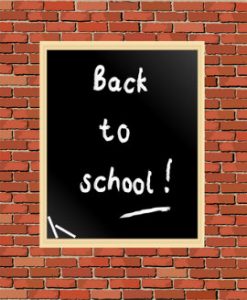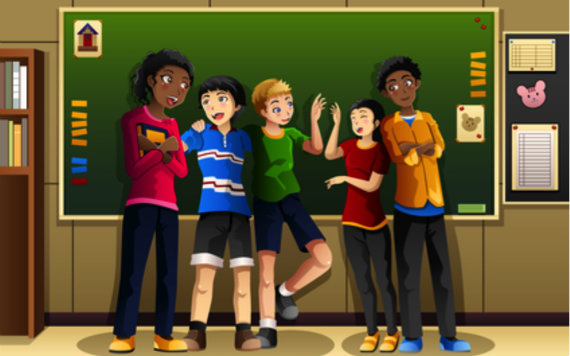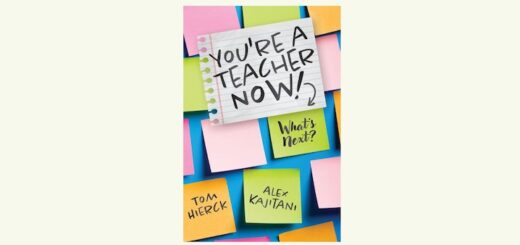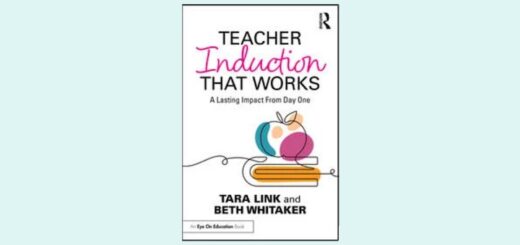Why I Love Teaching Middle School History
A MiddleWeb Blog
Middle school kids and middle school teaching are much maligned. So I want to go on record: Middle school rocks!”
 Full disclosure: if you had asked me 5 years ago if I would consider teaching middle school, my answer would have been an unqualified “no way.” When I decided to enter the teaching profession in the 1990s, it was to be a high school history teacher.
Full disclosure: if you had asked me 5 years ago if I would consider teaching middle school, my answer would have been an unqualified “no way.” When I decided to enter the teaching profession in the 1990s, it was to be a high school history teacher.
Teaching middle school wasn’t even on my radar. How, I thought, could one ever really grapple with the big questions of history with early adolescents?!
But the job market was not good for history teachers when I finished, and so I took the only job available: teaching 7th grade cultural geography. I found it far more satisfying than I ever would have guessed, but when I had the opportunity to switch to 11th grade U.S. history, I took the job with no hesitation.
Flash forward 15 years, after two kids of my own and a stint teaching student teachers. I found myself itching to get back to the pre-college classroom. I had no intention of going back to the middle level.
By this time, I’d identified as a high school teacher. My own children were in middle school, and like so many young adolescents, they hated it.
(Why do kids hate middle school so much? Why is it, when you tell folks that you teach middle school, they look at you like you’re crazy or some kind of hero for doing the world’s dirty work?)
A different kind of calling

My own son was in 8th grade, at a different school. His teacher was truly gifted – perhaps one of the best teachers my son will ever have. I thought about this teacher’s influence on kids at an age widely viewed as “the worst.” Could I have that sort of impact?
Could I make a difference in the lives of kids going through puberty who had little interest in history? Could I achieve personal satisfaction?
It’s too soon to measure the difference I might be making, but as to personal satisfaction, I’m pleased to report the answer is a resounding “yes!” I have just finished my first year back in the classroom, teaching 7th grade, and I loved it.
Stuff to consider about teaching middle school
For those wondering whether you made the right decision to teach middle school – or for those of you thinking about switching to the middle level – here are a few things to consider. They reflect my experiences this past year, and I say none of them to disparage high school teaching. I spent six wonderful years there.
But middle school kids and middle school teaching are much maligned. So I want to go on record: Middle school rocks!
Why?
- Middle school students are enthusiastic about learning. Really. When I taught high school, my number one complaint about it was the apathy of so many students. They had tuned out or turned off. And many of them were asleep. (The numerous studies about adolescents and their sleep cycle helped me avoid taking their snores personally, but it was still frustrating.) Middle school students are not only more awake, but they are more enthused. I call this the “Fjord Effect” after an experience I had my first year of teaching. We were studying geographic features, and I showed students a picture of a fjord so they could see what they looked like. I got a resounding, “Whoaaaa!”
Fjords are beautiful, but that kind of reaction is atypical of high school classrooms. All year, as my seventh graders studied amazing and interesting things, I had plenty of students who, no matter how low their general enthusiasm for hard work and learning, still managed to muster a “whoa” when confronted with astounding facts like the death toll in the Civil War, or the fact that Jefferson and Adams both died on the 50th anniversary of the Declaration of Independence. If you know your stuff, and are excited about it, you can get middle school students excited, too.
- Middle school students are NOT the terrors of popular stereotypes. The same enthusiasm for learning is also manifest in their sense of humor and overall demeanor. Early adolescence may be tough for parents, but students are often better behaved for their teachers than they are for their parents. (Okay, a few are probably worse.) But the things we all remember about being that age—conflict with parents and friends, the awkwardness of our emerging sexuality—these things are certainly things we must acknowledge as teachers, but they do not present themselves as daily issues in the classroom.
- Bigger kids, bigger problems. You’ve perhaps heard this old adage as it applies to parenthood. True also in schools. You will encounter students with problems – serious ones – at every age. These problems, left unaddressed, will become worse as students get older. In middle school, we have the opportunity to address problems at a stage when students are more impressionable and under greater control of their parents and teachers.
- Grading. Let’s be honest: one of the worst parts of the teaching profession is grading. Good news, then, for middle school teachers. The grading is less onerous in middle school than in high school. My writing assignments were often a paragraph or two, rather than the page or two (or five) that I assigned in high school. Grading a stack of high school history essays is painful and terribly time-consuming. Grading a stack of paragraphs on the significance of the Missouri Compromise? Not so bad.
- Learning about the world. The main reason I love teaching is that I love to tap into the growing awareness students have about the bigger world around them. Teaching social studies means teaching kids about how they are connected to the world and how events in the past still influence our beliefs and actions today. When you teach middle school, you are getting kids at a key point in this intellectual development. This is new (ish) to them. And so they ask LOTS of questions. And what teacher doesn’t love to get questions?
Middle schoolers can wrestle with Big Questions
One of my fears about going “down” to middle school was whether I’d be able to have the kinds of discussions I had with my high school students. Could middle schoolers really grapple with the big questions of history: justice, social change, inequality and the like?
I have learned they can. But for them to do that, teachers need to be prepared. The danger we face as middle school teachers is thinking our students are not capable of learning complicated material, so we “dumb it down.”

And then it leads us to see how the interest in freeing slaves led others to consider the inequalities faced by American women. If we just teach the names (Nat Turner, William Lloyd Garrison, Angelina Grimké, Elijah Lovejoy, John Brown) and the basic facts, without delving into the rich stories and their writings, we won’t get that great discussion.
Some students were appalled by John Brown and Nat Turner; others thought they were heroic; others thought using force was unfortunate but necessary given the circumstances. The whole gamut. And great discussions and questions.
Difficult, joyous work
So the lesson I have learned is that teaching middle school may be more joyous than teaching high school – yeah, I’m going to use the word joyous – but it is not less work (except for the grading that I already mentioned).
You still have to know your stuff. You have to do your homework. You have to love what you teach and really learn it deeply, so that your students will love it and learn it, too.
Fjord photo: Erik A. Drabløs




































We need enthusiastic middle school teachers and teachers who love middle-schoolers! Kudos to you!
Thanks so much!
I made the switch to middle school teaching after 15 years of high school teaching and I agree with you 100%. Never thought I would want to work with this age group but I love it
I couldn’t agree more. That’s why I love writing for that age group, too- their appetite for discovery is unlimited, and when they encounter history, geography, or characters from the past they devour research and curiosity grows even further.
I teach English in middle school, and I agree with you, especially about sharing your passion with the kids. I have never taught high school, but in middle school, many times I am able to get them excited when I can show them why it’s exciting to me. And they do have their own ideas to share, and that is really fun!
So glad to hear that others feel the same. We need to get the word out that middle school kids are great to attract enthusiastic teachers.
I am certified in high school and middle school English in North Carolina. My intent was to teach high school. I graduated from college in the month of December, so I took a job mid year teaching 10th grade. My next job was 7th grade.Throughout my career I eventually taught every grade 6-12. The bulk of my experience has been in middle school. I love my middle school students! As an English teacher I grade a lot more than paragraphs. My kids write essays and research papers too. I am the middle school English department at our small charter school. I teach 2 sections of each grade (6, 7, and 8)! I am happy to say that I totally agree. Middle School ROCKS!!
Thank you for such an inspiring article! I teach 8th grade U.S. History and love it. My students are engaging and I feel like I learn from them as they’re learning from me. Middle school is a great place to be. Thank you for affirming that!
Thanks for the comments, Terry and Blair. It makes me so happy to know that others teach middle school because they love it.
Lauren, this is a beautiful tribute to the joys of middle school teaching. So glad you are enjoying the age group!
Not in Tokyo middle schoolers are the worst age to teach period! lol
I am inspired…I have just started teaching 6 grade Social studies. It has been challenging, but I am inspired…I will continue to learn the material that I can be knowledgable and inspiring to get the reactions you talk about.